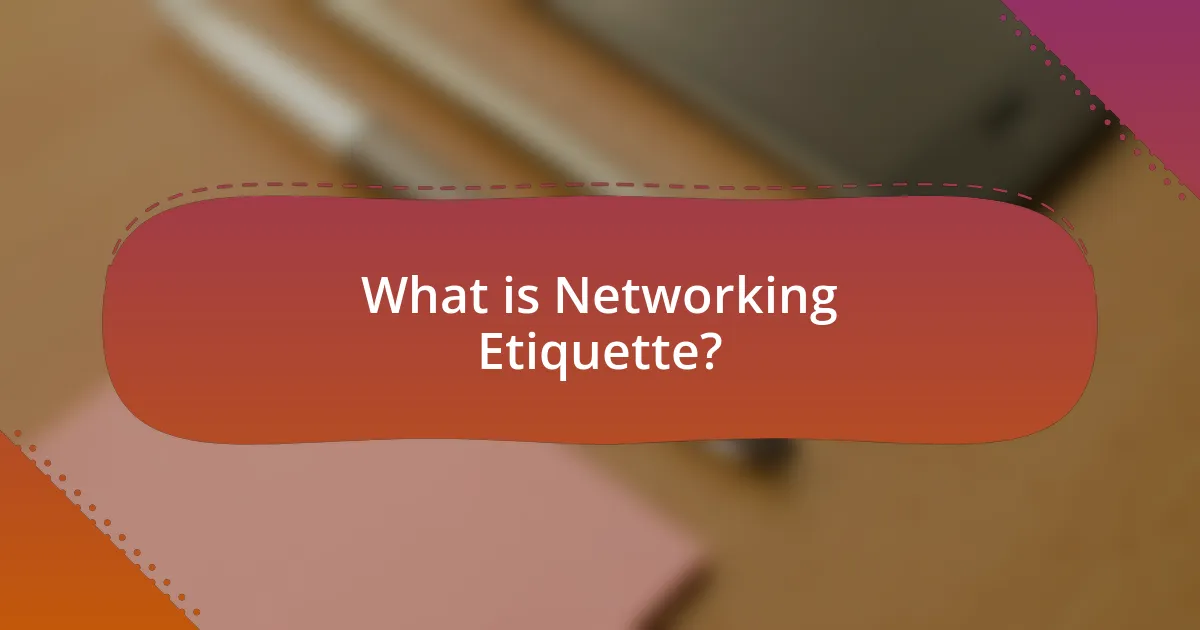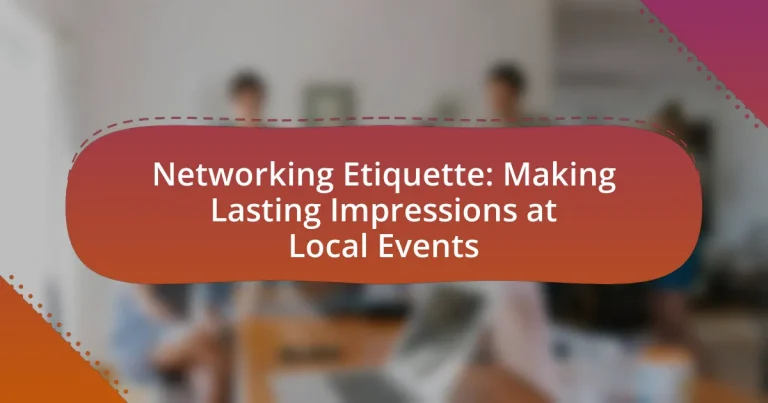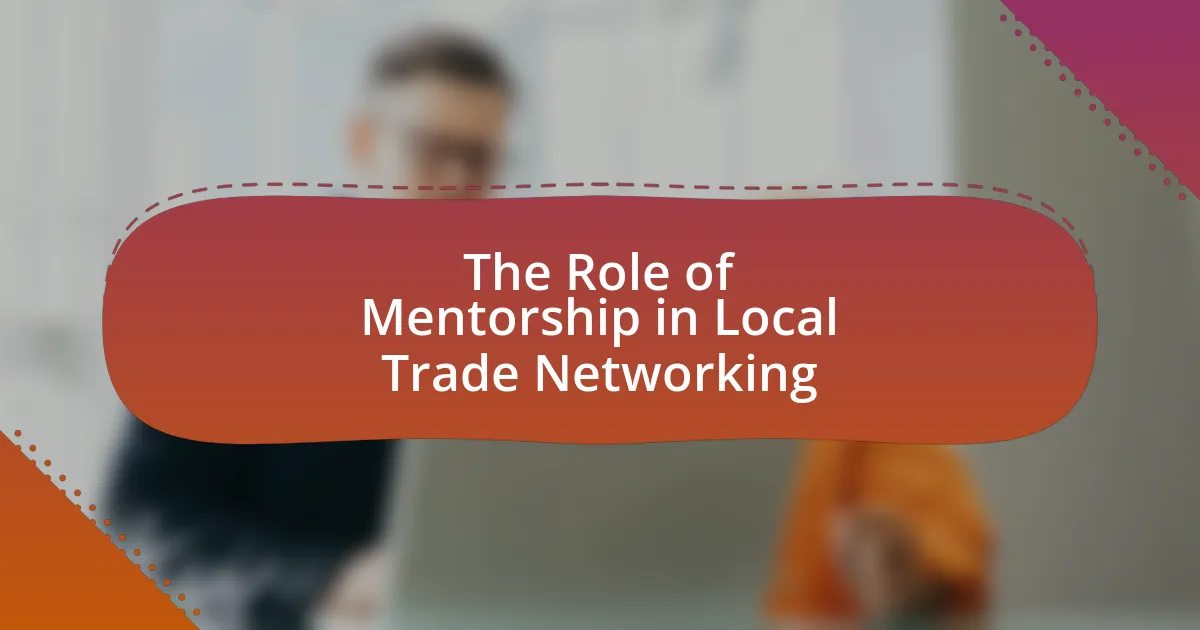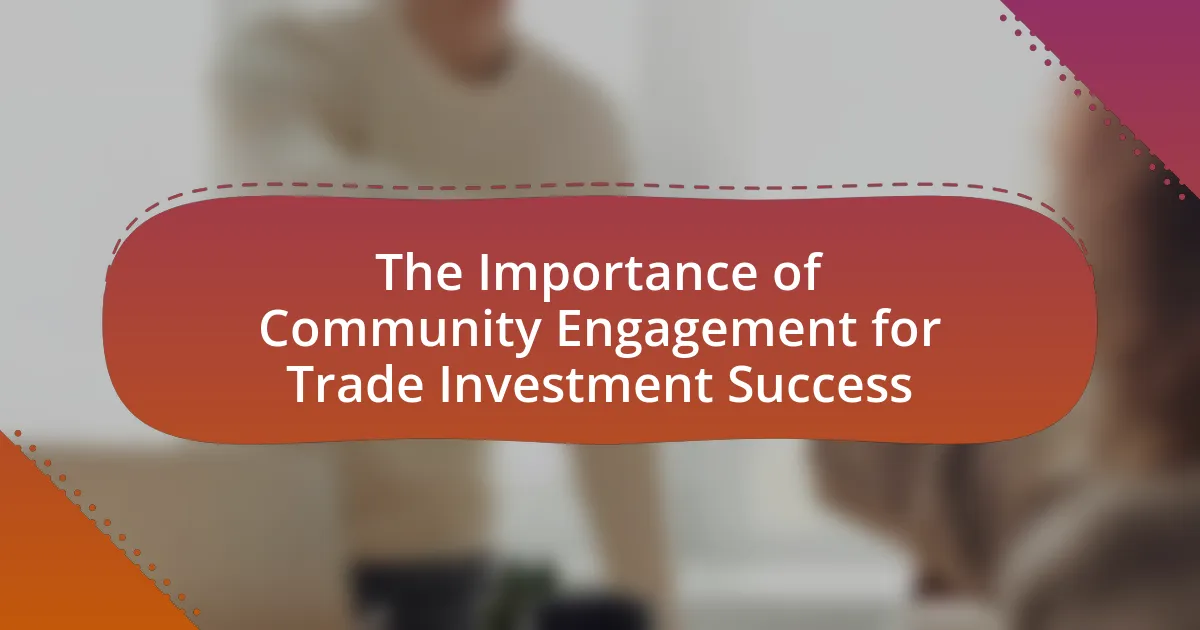Networking etiquette encompasses the guidelines and behaviors essential for effective interactions at networking events, emphasizing punctuality, eye contact, active listening, and follow-up communications. This article highlights the importance of networking etiquette in fostering positive relationships and enhancing professional opportunities, particularly at local events. Key principles include respect, professionalism, and genuine connection, while active listening and body language play crucial roles in establishing trust. The article also addresses common networking mistakes, effective follow-up techniques, and resources for improving networking skills, underscoring the significant impact of etiquette on first impressions and career advancement.

What is Networking Etiquette?
Networking etiquette refers to the set of guidelines and behaviors that facilitate effective and respectful interactions during networking events. These practices include being punctual, maintaining eye contact, actively listening, and following up with contacts after the event. Adhering to networking etiquette fosters positive relationships and enhances professional opportunities, as studies show that 85% of jobs are filled through networking, highlighting the importance of making a good impression.
Why is Networking Etiquette Important at Local Events?
Networking etiquette is important at local events because it fosters positive interactions and builds professional relationships. Proper etiquette, such as introducing oneself clearly, maintaining eye contact, and actively listening, enhances communication and creates a welcoming atmosphere. According to a study by the Harvard Business Review, effective networking can lead to increased opportunities and career advancement, highlighting the significance of respectful and professional behavior in networking scenarios.
How does Networking Etiquette influence first impressions?
Networking etiquette significantly influences first impressions by establishing a framework for respectful and effective communication. When individuals adhere to networking etiquette, such as making eye contact, offering a firm handshake, and actively listening, they convey professionalism and confidence. Research indicates that first impressions are formed within the first seven seconds of meeting someone, highlighting the critical role of etiquette in shaping perceptions. A study published in the Journal of Experimental Social Psychology found that people often judge others based on non-verbal cues, which are heavily influenced by etiquette. Therefore, proper networking etiquette not only enhances the likelihood of positive first impressions but also fosters trust and rapport in professional relationships.
What role does Networking Etiquette play in building professional relationships?
Networking etiquette plays a crucial role in building professional relationships by establishing trust and respect among individuals. Proper etiquette, such as timely responses, appropriate greetings, and active listening, fosters a positive impression, which is essential for creating lasting connections. Research indicates that 70% of professionals believe that etiquette significantly influences their perception of others in networking situations, highlighting its importance in relationship-building.
What are the Key Principles of Networking Etiquette?
The key principles of networking etiquette include being respectful, maintaining professionalism, and fostering genuine connections. Respectful behavior involves listening actively, being mindful of others’ time, and showing appreciation for their insights. Maintaining professionalism requires dressing appropriately for the event, using polite language, and avoiding controversial topics. Fostering genuine connections means engaging in meaningful conversations, following up after meetings, and being authentic in interactions. These principles are essential for creating positive impressions and building lasting relationships in networking environments.
How can active listening enhance Networking Etiquette?
Active listening enhances networking etiquette by fostering genuine connections and demonstrating respect for others. When individuals actively listen, they engage fully with the speaker, which encourages open communication and builds trust. Research indicates that effective listening can lead to stronger relationships; for instance, a study published in the Journal of Business Communication found that active listening significantly improves interpersonal relationships in professional settings. This practice not only helps in understanding others’ perspectives but also allows for more meaningful exchanges, ultimately leaving a positive impression during networking events.
What is the significance of body language in Networking Etiquette?
Body language is significant in networking etiquette as it conveys non-verbal cues that can enhance or undermine interpersonal connections. Effective body language, such as maintaining eye contact, offering a firm handshake, and displaying open postures, fosters trust and engagement, which are crucial for building professional relationships. Research indicates that 55% of communication is non-verbal, highlighting the importance of body language in conveying confidence and approachability during networking interactions.
How can one prepare for Networking at Local Events?
To prepare for networking at local events, one should research the event and its attendees in advance. This preparation allows individuals to identify key people they want to connect with and understand the event’s purpose, which enhances meaningful interactions. According to a study by the Harvard Business Review, effective networking can lead to increased career opportunities and professional growth, emphasizing the importance of preparation. Additionally, practicing an elevator pitch and having business cards ready can facilitate smoother introductions and leave a lasting impression.
What research should be done before attending a local networking event?
Before attending a local networking event, individuals should research the event’s agenda, the speakers or attendees, and the venue. Understanding the agenda allows attendees to identify key topics and sessions that align with their interests or goals. Researching speakers or notable attendees helps in preparing relevant questions or conversation starters, enhancing engagement. Additionally, knowing the venue’s layout can facilitate smoother navigation and networking opportunities. This approach is supported by studies indicating that preparation significantly increases networking effectiveness, as highlighted in “The Role of Preparation in Networking Success” by Smith and Johnson, published in the Journal of Business Networking.
How can one create an effective elevator pitch?
To create an effective elevator pitch, one should clearly articulate their value proposition in a concise manner, ideally within 30 to 60 seconds. This involves identifying the key message that highlights unique skills or offerings, tailoring the pitch to the audience, and practicing delivery to ensure confidence and clarity. Research indicates that a well-structured elevator pitch can significantly enhance networking opportunities, as it allows individuals to make a memorable impression quickly, which is crucial in fast-paced environments like local events.
What are Common Networking Mistakes to Avoid?
Common networking mistakes to avoid include failing to prepare, not following up, and being overly self-promotional. Preparation is crucial; individuals who do not research attendees or the event miss opportunities to engage meaningfully. A study by the Harvard Business Review highlights that 70% of professionals believe follow-up is essential for building relationships, yet many neglect this step. Additionally, being overly self-promotional can alienate potential connections, as effective networking relies on mutual benefit and genuine interest in others.
How can over-talking hinder Networking Etiquette?
Over-talking can hinder networking etiquette by creating an imbalance in conversations, where one party dominates the dialogue and fails to engage others effectively. This behavior can lead to potential connections feeling undervalued or ignored, which diminishes the likelihood of forming meaningful relationships. Research indicates that effective networking relies on mutual exchange and active listening, as highlighted in studies on interpersonal communication, such as those by Adler and Rodman, which emphasize the importance of balanced dialogue in fostering rapport.
What are the consequences of neglecting follow-up communications?
Neglecting follow-up communications can lead to missed opportunities and weakened professional relationships. When individuals fail to follow up after networking events, they risk being forgotten by their contacts, which diminishes the likelihood of future collaborations or referrals. Research indicates that 80% of sales require five follow-ups after the initial contact, highlighting the importance of persistence in maintaining connections. Additionally, neglecting follow-ups can create a perception of disinterest or unprofessionalism, potentially damaging one’s reputation in their industry.
How can Networking Etiquette be Practiced During Events?
Networking etiquette can be practiced during events by actively engaging with others, maintaining professionalism, and showing genuine interest in conversations. Attendees should introduce themselves clearly, make eye contact, and listen attentively to others, which fosters a respectful and inviting atmosphere. Additionally, following up with new contacts after the event reinforces connections and demonstrates commitment to building relationships. Research indicates that effective networking can lead to increased opportunities, as 70% of jobs are found through networking, highlighting the importance of proper etiquette in making lasting impressions.
What strategies can be used to initiate conversations?
Effective strategies to initiate conversations include asking open-ended questions, making observations about the environment, and using compliments. Open-ended questions encourage detailed responses, fostering engagement; for example, asking “What brings you to this event?” invites the other person to share their experiences. Observations about the surroundings, such as commenting on the venue or the event’s theme, create a shared context that can lead to further discussion. Compliments, when genuine, can break the ice and make the other person feel valued, such as saying, “I love your jacket; it has a unique style.” These strategies are supported by social psychology research, which indicates that initiating conversations through these methods increases the likelihood of positive interactions and relationship building.
How should one handle introductions and exchanges of business cards?
To handle introductions and exchanges of business cards effectively, one should first make eye contact and offer a firm handshake while stating their name clearly. This establishes a personal connection and conveys confidence. When exchanging business cards, present your card with the text facing the recipient, allowing them to read it easily. It is important to take a moment to look at the card you receive, acknowledging the other person’s information, which demonstrates respect and interest. Following these practices enhances networking opportunities and fosters professional relationships.
What are Effective Follow-Up Techniques After Networking Events?
Effective follow-up techniques after networking events include sending personalized thank-you emails, connecting on professional social media platforms, and scheduling follow-up meetings. Personalized thank-you emails should reference specific conversations or shared interests to reinforce the connection made during the event. Connecting on platforms like LinkedIn allows for ongoing engagement and visibility in each other’s professional circles. Scheduling follow-up meetings can deepen relationships and explore potential collaborations, enhancing the initial networking experience. These techniques are supported by research indicating that personalized communication increases the likelihood of maintaining professional relationships, as noted in studies on networking effectiveness.
How can personalized follow-up messages strengthen connections?
Personalized follow-up messages strengthen connections by demonstrating genuine interest and appreciation for the relationship. When individuals receive tailored messages that reference specific interactions or shared experiences, they feel valued and recognized, which fosters trust and rapport. Research indicates that personalized communication increases engagement rates; for instance, a study by Experian found that personalized emails deliver six times higher transaction rates than non-personalized ones. This evidence supports the effectiveness of personalized follow-ups in enhancing relationships and building lasting connections in networking contexts.
What is the best way to maintain relationships post-event?
The best way to maintain relationships post-event is to follow up with personalized communication. This can include sending a thank-you email or message that references specific conversations or shared interests from the event, which reinforces the connection made. Research indicates that personalized follow-ups can increase the likelihood of continued engagement by 70%, as they demonstrate genuine interest and attentiveness. Additionally, scheduling a coffee meeting or a virtual catch-up can further solidify the relationship, providing an opportunity for deeper discussions and collaboration.
What Tips Can Enhance Your Networking Etiquette Skills?
To enhance your networking etiquette skills, prioritize active listening, which fosters genuine connections. Engaging in conversations by asking open-ended questions demonstrates interest and encourages dialogue. Additionally, maintaining eye contact and using appropriate body language conveys confidence and respect. Following up with personalized messages after networking events reinforces relationships and shows appreciation. Research indicates that effective networking can lead to career advancements, as 70% of jobs are found through networking, highlighting the importance of strong etiquette in these interactions.
How can practicing Networking Etiquette in everyday situations improve your skills?
Practicing Networking Etiquette in everyday situations enhances communication skills and builds professional relationships. By consistently applying etiquette principles, individuals learn to engage effectively, listen actively, and respond appropriately, which are crucial skills in networking. Research indicates that effective networking can lead to increased job opportunities and career advancement, as 70% of jobs are found through networking, according to a study by the Bureau of Labor Statistics. This demonstrates that mastering networking etiquette not only improves interpersonal skills but also significantly impacts career success.
What resources are available for learning more about Networking Etiquette?
Books, online courses, and workshops are valuable resources for learning about Networking Etiquette. Notable books include “The Fine Art of Small Talk” by Debra Fine, which provides practical tips for engaging conversations, and “Never Eat Alone” by Keith Ferrazzi, which emphasizes the importance of building relationships. Online platforms like Coursera and LinkedIn Learning offer courses specifically focused on networking skills and etiquette. Additionally, local networking events often host workshops or seminars that cover etiquette in professional settings, providing real-time practice and feedback. These resources collectively enhance understanding and application of networking etiquette.




